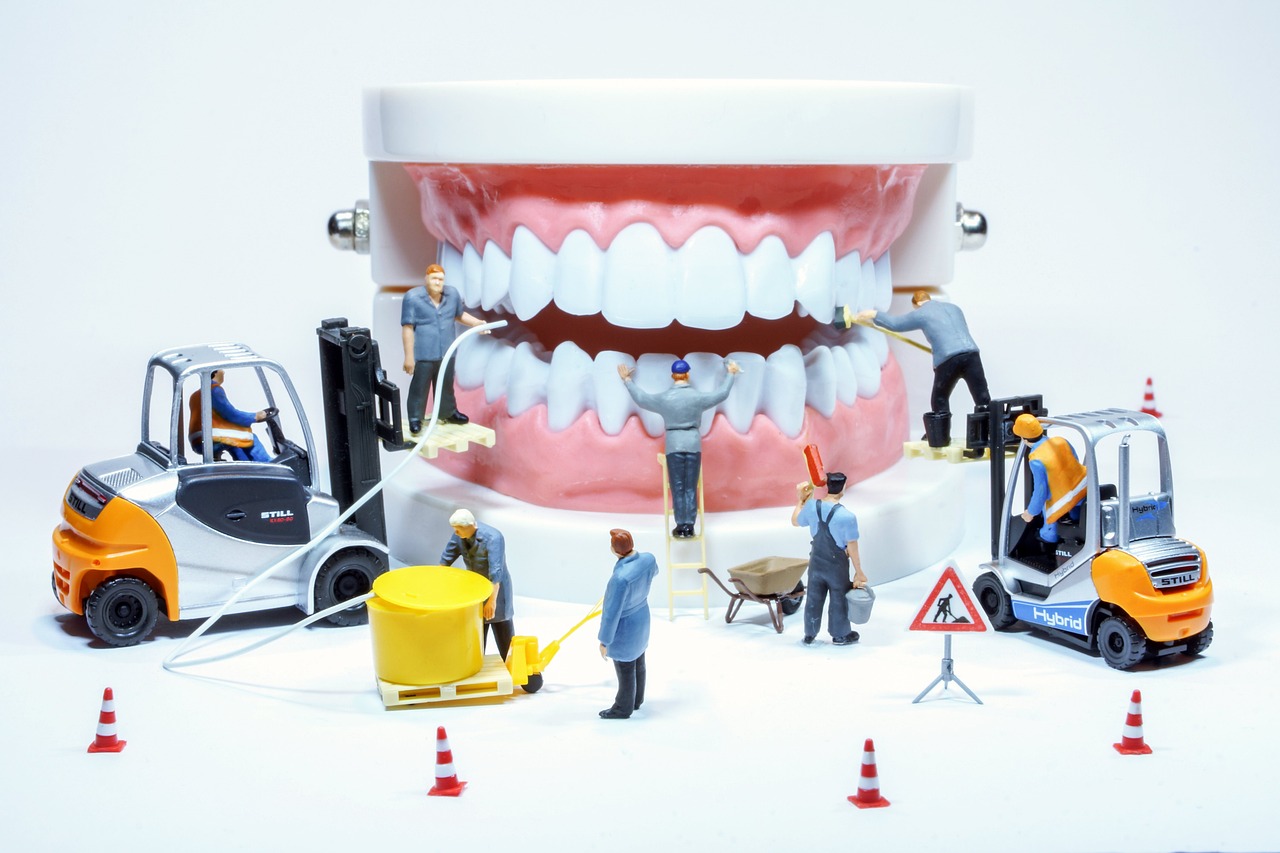“The Importance of Dental Care for Children” is a comprehensive article that covers a wide range of health topics related to children. This informative content aims to provide valuable information and advice to parents and caregivers about the well-being of their children. Within the article, readers can find insights on various health issues such as anxiety, exercise for children with asthma, bedwetting, chickenpox, conjunctivitis, and many more. Of particular significance, the article emphasizes the importance of dental care for children, highlighting the benefits and necessary practices to maintain good oral health in young ones. Additionally, the content offers a symptom checker and a health service finder tool to assist parents in identifying and accessing appropriate care for their children’s health needs.
The Importance of Dental Care for Children
Dental care is an essential aspect of overall health for children. Good dental hygiene habits and regular dental check-ups are crucial in preventing tooth decay, cavities, and other oral health issues. In this article, we will delve into the importance of dental care for children and provide comprehensive information on various aspects of pediatric dental care.
Overview of Dental Care for Children
Why Dental Care is Important for Children
Dental care is vital for children for several reasons. First and foremost, maintaining good oral health from a young age sets the foundation for a lifetime of healthy teeth and gums. Children who practice proper dental hygiene are more likely to have strong, cavity-free teeth as they grow older. Moreover, children with healthy teeth are less likely to experience discomfort or pain, enabling them to eat well and speak clearly.
Additionally, dental care plays a significant role in preventing oral health issues in adulthood. Poor dental hygiene during childhood can lead to tooth decay, gum disease, and other problems that may persist into adulthood. By instilling good oral hygiene habits in children, parents and caregivers can help them avoid these issues in the long run.

When to Start Dental Care for Children
Dental care should begin as soon as a child’s first tooth emerges, which is typically around six months of age. Even before the eruption of the first tooth, parents should gently wipe their baby’s gums with a clean, damp cloth after feedings. Once the first tooth appears, a soft-bristled infant toothbrush can be used to clean it. Establishing a dental care routine early on ensures that children become accustomed to the process and understand its importance.
Common Dental Issues in Children
Children are susceptible to various dental issues that can impact their oral health. Some common dental problems in children include cavities, tooth decay, gum disease, and misaligned teeth. These issues can cause pain, discomfort, difficulty in chewing, and even affect the child’s overall well-being. By addressing these problems early on, parents and dental professionals can prevent further complications and ensure optimal oral health for children.
Establishing Good Oral Hygiene Habits
Establishing good oral hygiene habits is essential for children to maintain healthy teeth and gums. By teaching children the importance of regular brushing and flossing, parents can instill lifelong practices that contribute to their overall oral health.
Brushing Techniques for Children
Proper brushing techniques are crucial for effective oral care. When brushing a child’s teeth, it is important to use a soft-bristled toothbrush and fluoride toothpaste. Parents should guide their children in using small, circular motions to clean each tooth gently. It is recommended to brush for two minutes, twice a day, ensuring that all surfaces of the teeth are thoroughly cleaned.
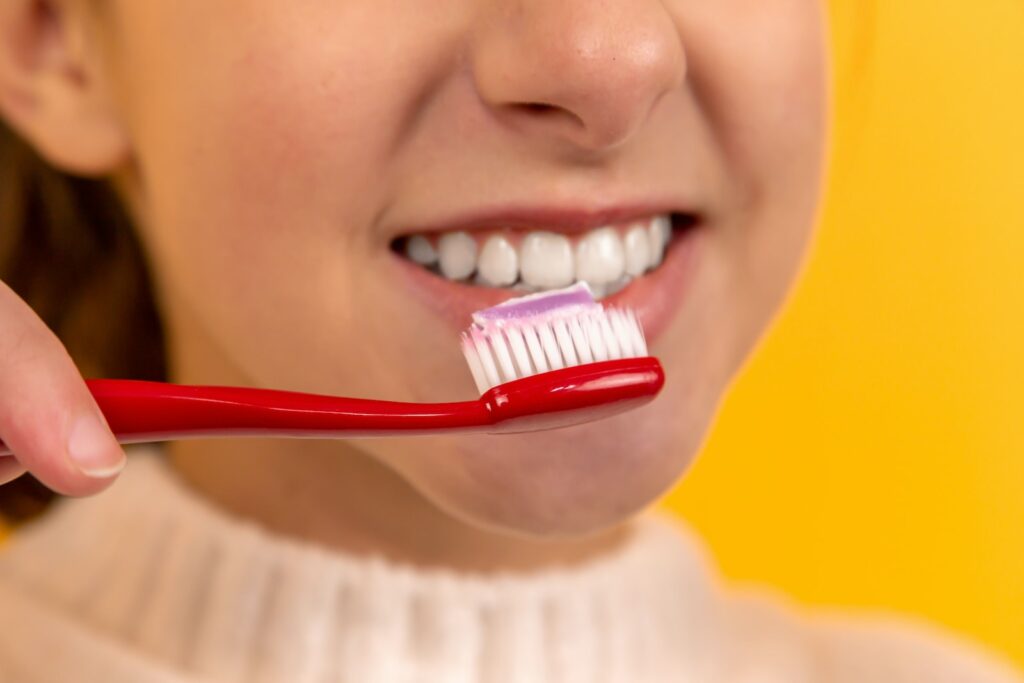
Choosing the Right Toothbrush and Toothpaste
Selecting the right toothbrush and toothpaste is an important aspect of establishing good oral hygiene habits. For children, it is advisable to choose a toothbrush with a small head and soft bristles. The toothbrush should be replaced every three to four months or when the bristles become frayed. As for toothpaste, parents should opt for a fluoride toothpaste that is approved by dental professionals.
Teaching Children How to Floss
Flossing is another crucial step in maintaining optimal oral hygiene. Parents should begin flossing their child’s teeth as soon as there are two teeth that touch each other. As the child grows older and gains the dexterity to floss on their own, parents should teach them the proper flossing technique. Using about 18 inches of dental floss, parents can guide their child on how to gently slide the floss between each tooth, forming a C-shape around the tooth to clean it thoroughly.
Making Oral Hygiene Fun for Kids
Oral hygiene doesn’t have to be a chore for children. By making it a fun and engaging activity, parents can encourage their children to develop good dental care habits. Parents can consider using toothbrushes and toothpaste with their child’s favorite cartoon characters or play their child’s favorite song during brushing time. Additionally, turning brushing and flossing into a family activity can make it more enjoyable for children.
Preventing Tooth Decay and Cavities
Tooth decay and cavities are prevalent dental issues in children, but they can be prevented through proper dental care and a healthy diet.
The Role of Sugar in Tooth Decay
Sugar plays a significant role in the development of tooth decay. When children consume sugary foods and drinks, bacteria in the mouth feed on the sugars and produce acid. This acid, in turn, attacks the tooth enamel, leading to the formation of cavities. It is essential for parents to limit their child’s consumption of sugary snacks and beverages to reduce the risk of tooth decay.
Limiting Sugary Snacks and Drinks
One of the most effective ways to prevent tooth decay is by limiting sugary snacks and drinks in a child’s diet. Instead of sugary treats, parents should encourage their children to consume healthier alternatives such as fruits, vegetables, and dairy products. It is also important to avoid prolonged exposure to sugary foods and drinks by encouraging children to finish their snacks and then brush their teeth.
The Importance of Fluoride
Fluoride is a mineral that plays a crucial role in preventing tooth decay. It strengthens tooth enamel and helps to reverse the early stages of tooth decay. Using fluoride toothpaste and drinking fluoridated water can significantly contribute to the prevention of cavities in children. However, it is important to follow dental professionals’ recommendations regarding the appropriate amount of fluoride for different age groups.
Sealants for Decay Prevention
Dental sealants are a preventive measure that can be used to protect children’s teeth from decay. A dental sealant is a thin, plastic coating that is applied to the chewing surfaces of the back teeth. It acts as a barrier, preventing food particles and bacteria from settling in the grooves of the teeth. Sealants are a cost-effective and non-invasive way to reduce the risk of cavities in children.
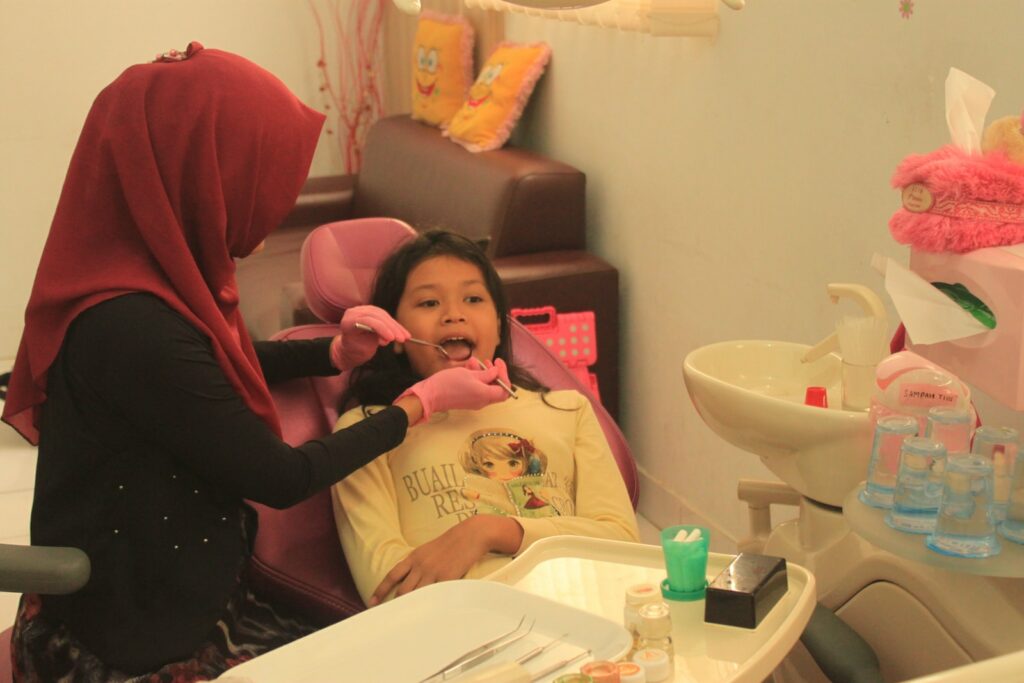
The Role of Diet in Dental Health
Diet plays a significant role in maintaining optimal dental health in children. By following a nutritious and balanced diet, parents can support their child’s oral health and prevent dental issues.
Nutritional Tips for Healthy Teeth
A well-balanced diet is essential for strong and healthy teeth. Parents should ensure that their child’s diet includes a variety of foods from different food groups. This includes fruits, vegetables, whole grains, lean proteins, and dairy products. Incorporating foods rich in calcium, vitamins, and minerals can contribute to the development of strong teeth and gums.
Foods That Promote Dental Health
Some foods have specific benefits for dental health. For example, foods rich in calcium, such as milk, cheese, and yogurt, help to strengthen tooth enamel. Crunchy fruits and vegetables, like apples and carrots, stimulate saliva production, which helps to wash away food particles and neutralize acids in the mouth. Foods rich in vitamin C, such as citrus fruits and strawberries, promote healthy gums.
Foods to Avoid for Better Oral Health
Certain foods and drinks can be detrimental to dental health. Parents should limit their child’s consumption of sugary snacks, carbonated drinks, and acidic foods. These items contribute to tooth decay and erosion of tooth enamel. Additionally, sticky foods, such as chewy candies and dried fruits, can get stuck in the teeth and increase the risk of cavities.
The Importance of Regular Dental Check-ups
Regular dental check-ups are vital for children’s oral health. These visits allow dental professionals to monitor the child’s dental development, identify any potential issues, and provide preventive and corrective treatments as necessary.
Recommended Frequency of Dental Check-ups
Ideally, children should visit the dentist every six months for routine check-ups and cleanings. However, the frequency may vary depending on the child’s oral health needs and any underlying dental issues. Dental professionals can provide guidance on the appropriate frequency of dental visits for each individual child.
What to Expect During a Pediatric Dental Visit
During a pediatric dental visit, the dentist or dental hygienist will examine the child’s teeth, gums, and overall oral health. They will clean the teeth, removing any plaque or tartar buildup. X-rays may be taken to assess the child’s dental development and identify any hidden issues. The dentist will also provide guidance on proper oral hygiene techniques, discuss any concerns, and answer any questions the child or parent may have.
The Benefits of Professional Teeth Cleaning
Professional teeth cleaning is a crucial part of regular dental check-ups. Even with consistent brushing and flossing, plaque and tartar can accumulate in hard-to-reach areas of the mouth. Dental professionals use specialized tools to remove these deposits, reducing the risk of gum disease, cavities, and other oral health problems. Professional cleaning also provides an opportunity for dental professionals to detect any early signs of dental issues.
Early Detection of Dental Issues
Regular dental check-ups enable early detection and intervention in dental issues. Dental professionals can identify potential problems, such as misalignment, tooth decay, or gum disease, at their earliest stages. Early intervention allows for more effective and less invasive treatments, preventing further complications and improving outcomes.

Benefits of Early Orthodontic Intervention
Early orthodontic intervention can have several long-term benefits for children. Orthodontic treatment at a young age can address dental issues, correct misaligned teeth, and promote proper oral development.
The Significance of Early Orthodontic Evaluation
An early orthodontic evaluation is essential to identify any potential orthodontic issues in children. By the age of seven, many permanent teeth have erupted, making it an ideal time for orthodontists to assess dental development. Early evaluation allows orthodontists to detect and address any developing problems, such as crowding, crossbite, or protruding front teeth.
Common Orthodontic Problems in Children
Children may experience a variety of orthodontic problems that require early intervention. Some common issues include overcrowding, excessive spacing, crossbite, overbite, underbite, or misaligned teeth. These problems can affect the child’s bite, speech, and overall oral health. Early orthodontic treatment can help correct these issues and improve the child’s oral function and aesthetics.
Treatment Options for Children
Early orthodontic treatment options vary depending on the specific orthodontic issue and the child’s age. In some cases, orthodontists may recommend braces to correct misalignments or crowded teeth. Other treatment options may include removable appliances or aligners. Orthodontic treatment at a young age can often be more effective and require less extensive interventions later in life.
Protecting Children’s Oral Health During Sports
Participating in sports is an important aspect of a child’s development, but it can also pose risks to their oral health. Taking necessary precautions to protect the teeth and mouth during sports activities is crucial.
The Importance of Mouthguards
Mouthguards are essential in protecting children’s teeth and mouth during sports activities. They act as a cushion, absorbing impact and preventing injuries to the teeth, gums, lips, and jaw. Wearing a properly fitted mouthguard can significantly reduce the risk of dental injuries while playing sports.
Preventing Dental Injuries in Sports
To prevent dental injuries in sports, it is important to encourage children to wear mouthguards consistently. Additionally, parents and coaches should educate children about the potential risks and safety measures associated with their chosen sport. Reinforcing good sportsmanship and fair play can also contribute to creating a safe sports environment for children.
Choosing the Right Mouthguard
There are different types of mouthguards available, including stock mouthguards, boil-and-bite mouthguards, and custom-fitted mouthguards. Custom-fitted mouthguards, made by dental professionals, provide the best fit and protection. Parents should consult with dental professionals to determine the most appropriate type of mouthguard for their child.
Caring for Mouthguards
Proper care and maintenance of mouthguards are essential to ensure their effectiveness and longevity. Children should rinse their mouthguards with water after each use and store them in a clean, ventilated container. Regularly inspecting the mouthguard for any signs of wear or damage and replacing it when necessary is crucial.
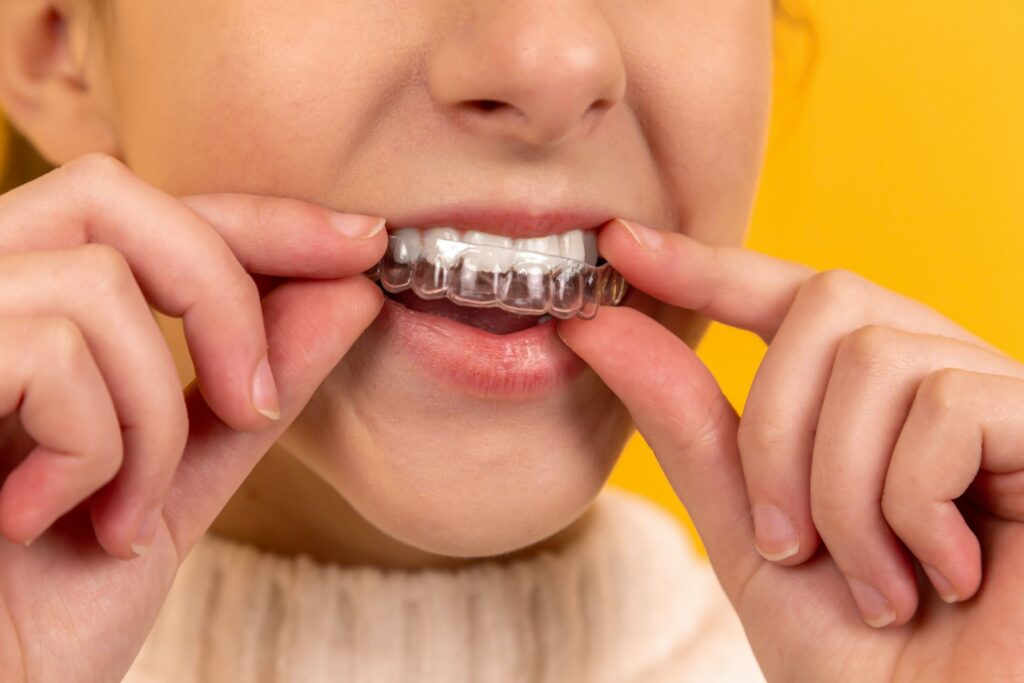
Addressing Dental Anxiety in Children
Dental anxiety is a common issue among children and can hinder their willingness to seek dental care. By understanding and addressing dental anxiety, parents and dental professionals can help children feel more comfortable and confident during dental visits.
Understanding Dental Anxiety in Kids
Dental anxiety in children can stem from various factors, including fear of pain, unfamiliarity with the dental environment, or negative past experiences. It is important for parents and dental professionals to empathize with children’s fears and take steps to alleviate them.
Tips for Easing Dental Anxiety
There are several strategies that parents and dental professionals can employ to ease dental anxiety in children. Creating a positive and welcoming dental environment, providing clear explanations of dental procedures, and using child-friendly language can help alleviate anxiety. Distraction techniques, such as watching a favorite movie or listening to music, can also divert the child’s attention during dental procedures.
Pediatric Dentistry Techniques for Anxious Children
Pediatric dentists are specially trained to work with children, including those with dental anxiety. They utilize techniques such as behavior management and distraction techniques to help anxious children feel more at ease during dental visits. Nitrous oxide (laughing gas) or oral sedation may also be used for children with severe dental anxiety.
The Role of Sedation Dentistry
In some cases, sedation dentistry may be necessary for children with intense dental anxiety or extensive dental procedures. Sedation dentistry involves the use of medication to help children relax during dental treatments. It is important for parents to consult with dental professionals to determine the most appropriate sedation option and understand the associated risks and benefits.
The Link Between Oral Health and Overall Health
Oral health is closely linked to overall health, highlighting the importance of dental care for children. Maintaining good oral hygiene and seeking regular dental check-ups can positively impact a child’s general well-being.
Oral Health and Systemic Health
Studies have shown that poor oral health can contribute to various systemic health issues in children. Dental problems, such as gum disease and tooth decay, have been linked to conditions like cardiovascular disease, diabetes, respiratory infections, and even preterm birth. By prioritizing oral health, parents can play a role in preventing these potential health complications.
The Impact of Oral Infections on Overall Health
Untreated dental infections can have serious consequences for a child’s overall health. Infections in the mouth can spread to other parts of the body, leading to systemic infections. Children with cavities or gum disease are more susceptible to bacterial infections, which can affect their immune system and overall health. Proper dental care and regular check-ups are crucial in preventing and addressing oral infections.
Good Oral Health Habits for a Healthy Life
Developing good oral health habits from an early age sets the stage for a lifetime of healthy teeth and gums. By teaching children the importance of proper dental care, parents are instilling habits that can positively impact their quality of life. Maintaining good oral health habits throughout childhood and adolescence can significantly reduce the risk of dental issues in adulthood.
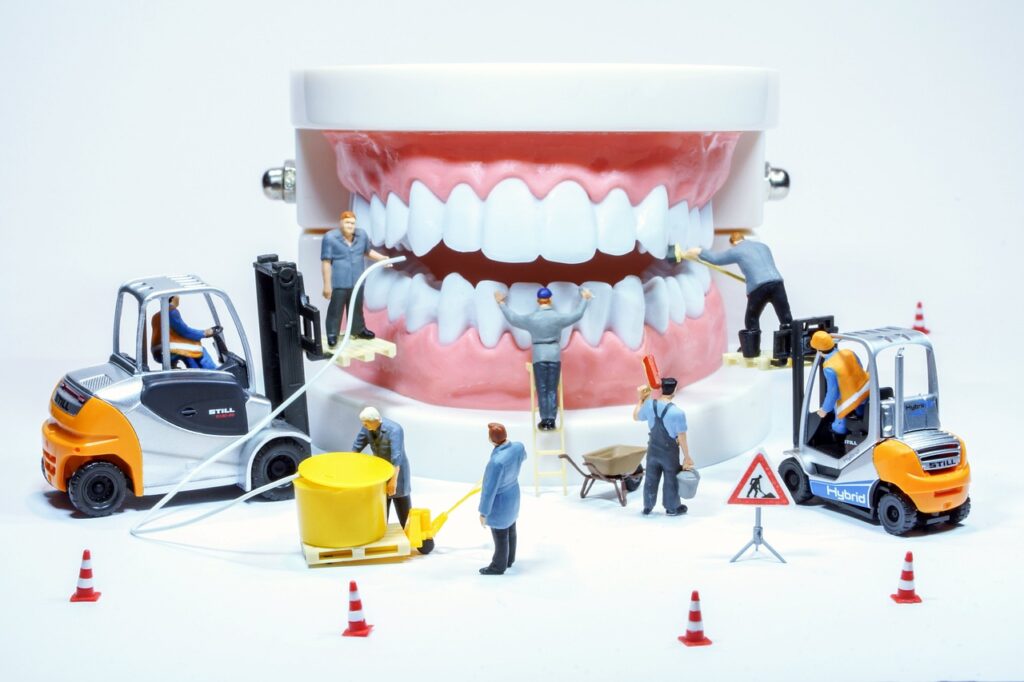
Teaching Children About the Importance of Dental Care
Educating children about the importance of dental care is a crucial step in ensuring their long-term oral health. By fostering a positive attitude towards dental care and involving children in their own oral hygiene routines, parents can empower children to take responsibility for their dental health.
Parents should explain to their children why dental care is important and how it contributes to their overall well-being. They can use age-appropriate language and visual aids to make the information more accessible and engaging. By incorporating dental care into daily routines, parents can help children develop a lifelong habit of maintaining optimal oral health.
Symptom Checker and Health Service Finder Tool
To assist parents in addressing their children’s dental concerns, a symptom checker and health service finder tool can be utilized. This tool allows parents to input symptoms or concerns related to their child’s oral health and receive guidance on the next steps to take. It can provide valuable information on when to seek professional dental care and help parents find a pediatric dentist in their area.
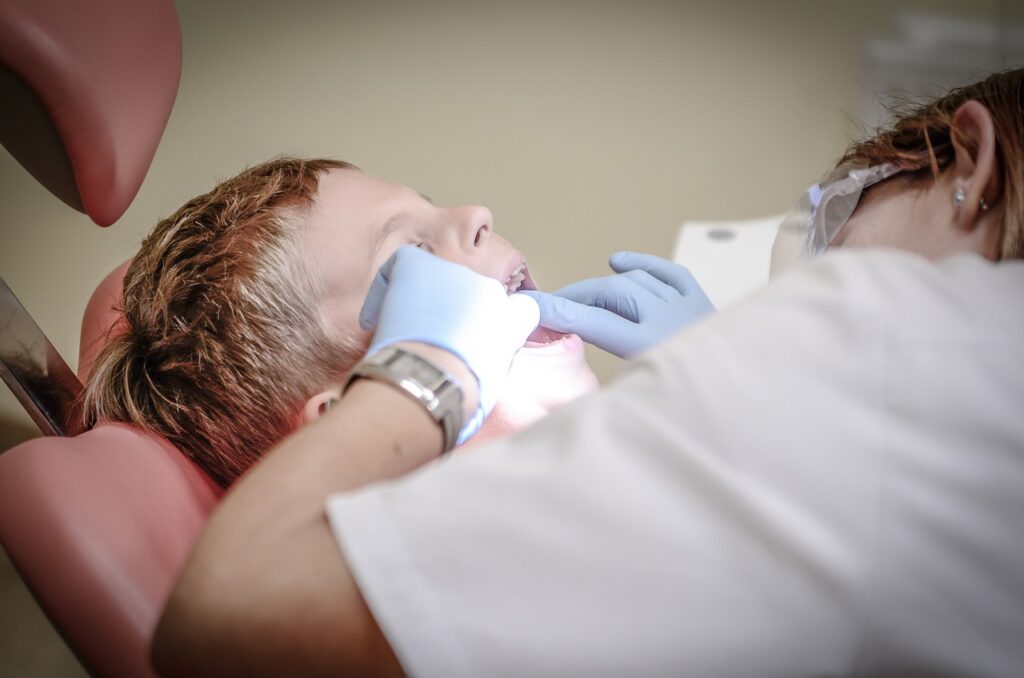
Finding a Pediatric Dentist Near You
When it comes to pediatric dental care, finding the right dentist is crucial. Pediatric dentists specialize in treating children and have the expertise to address their unique oral health needs. Parents can utilize online directories or consult with their child’s pediatrician for recommendations on reputable pediatric dentists in their area.
In conclusion, dental care is of utmost importance for children to ensure optimal oral health. By establishing good oral hygiene habits, preventing tooth decay and cavities, understanding the role of diet, seeking regular dental check-ups, addressing dental anxiety, and promoting the link between oral health and overall health, parents can pave the way for their children’s healthy smiles and a lifetime of good oral hygiene practices.
